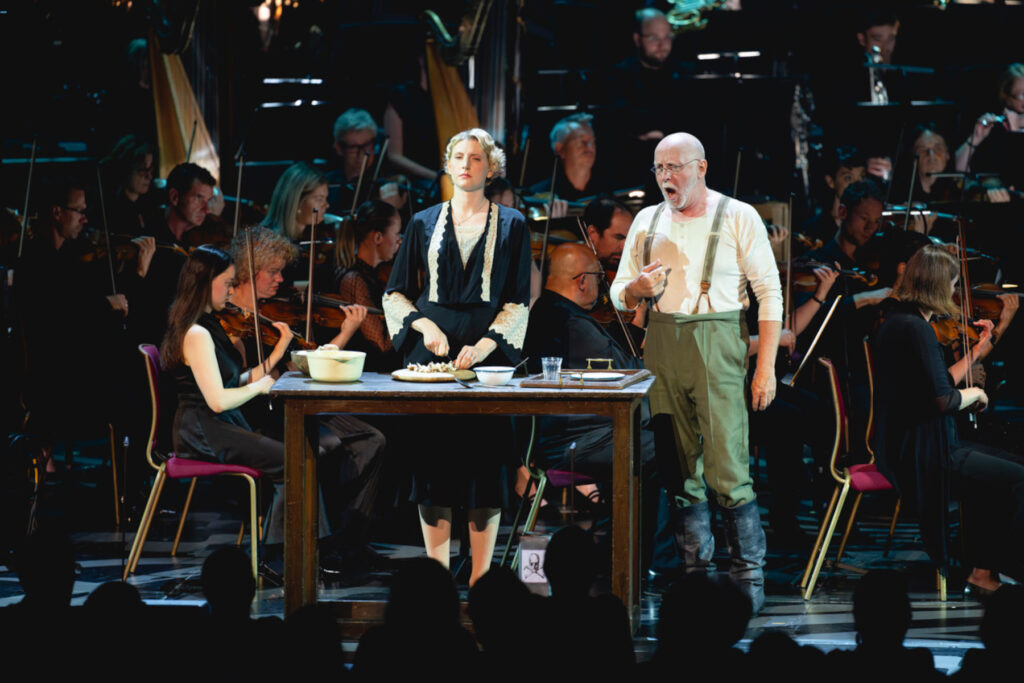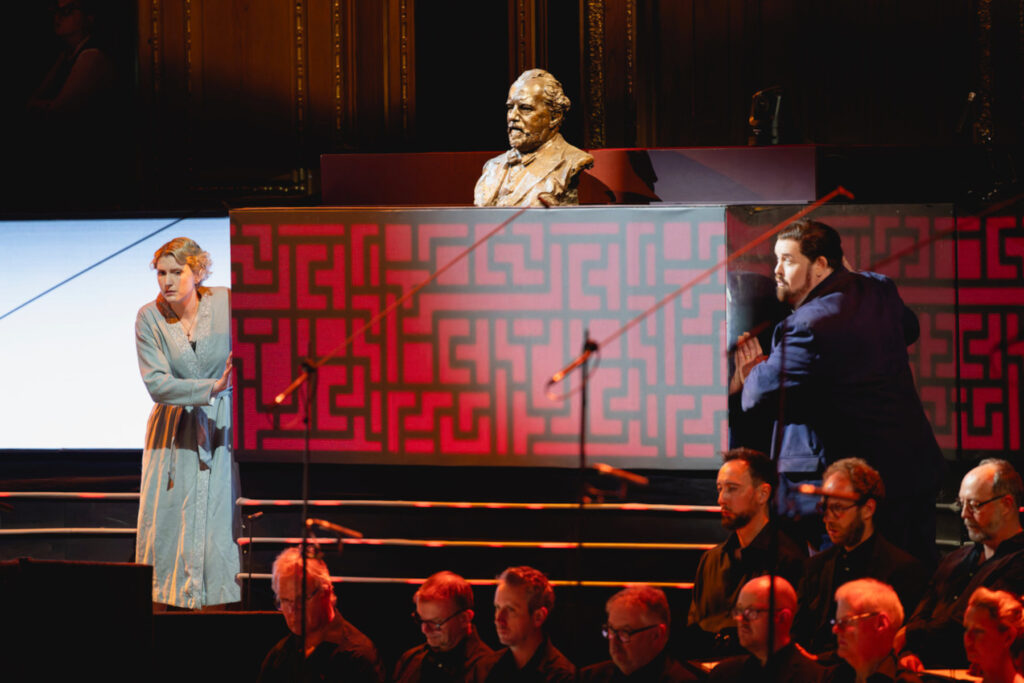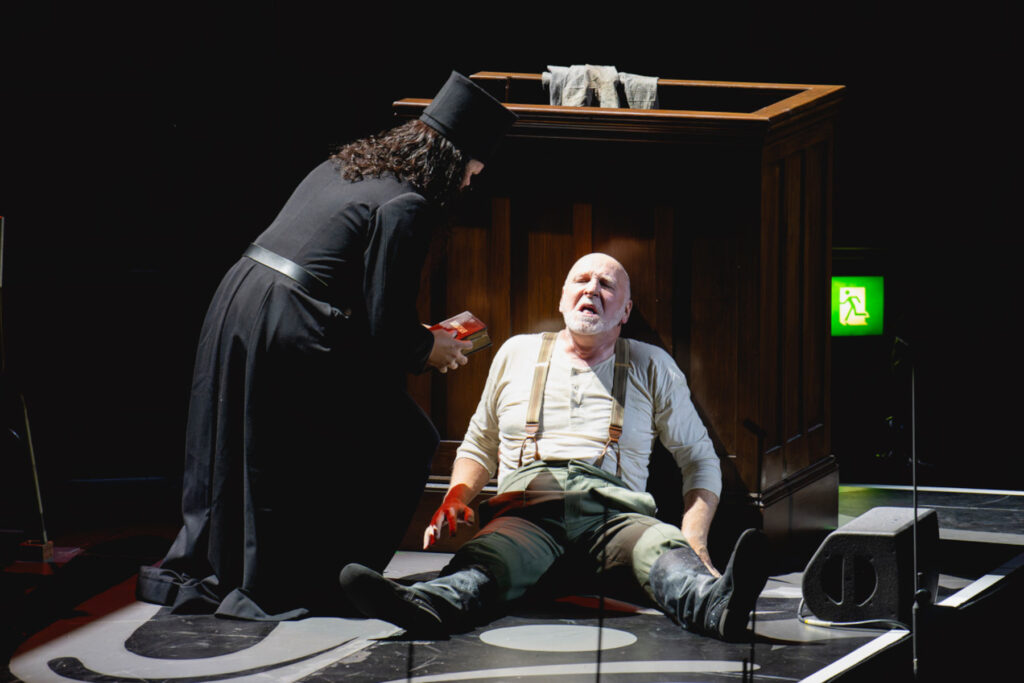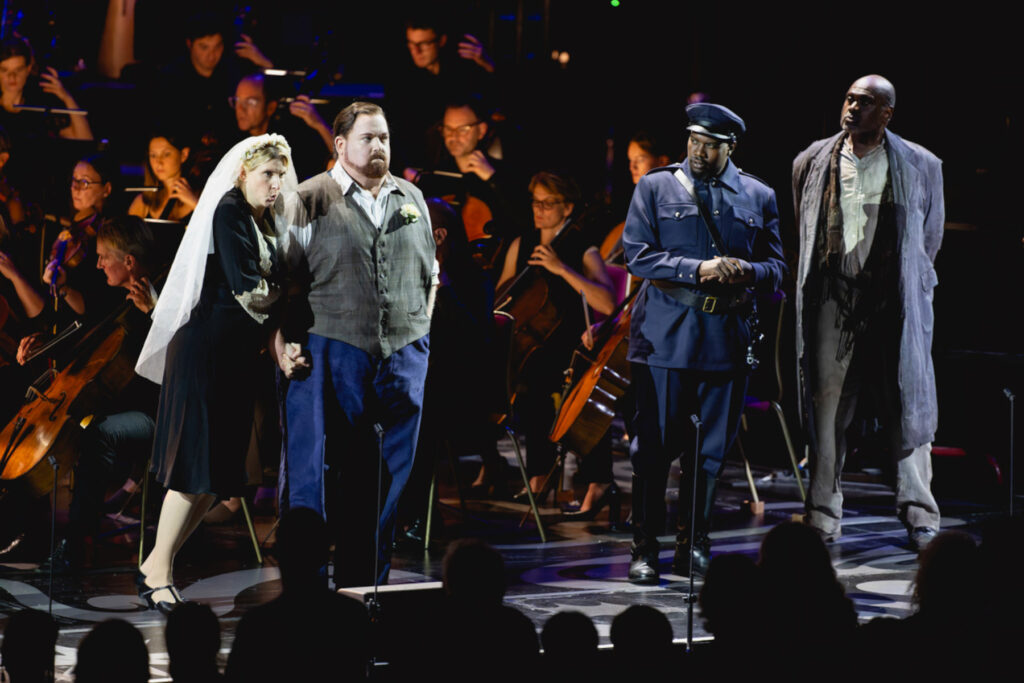A wailing clarinet, a forlorn cor anglais and a post-coital trombone could hardly have been more ear-catching in this arresting performance of Lady Macbeth of Mtsensk given at the Royal Albert Hall to mark the 50th anniversary of Shostakovich’s death. Perhaps it was this graphic content within the score that motivated Stalin’s famous denunciation of the opera in 1936, rather than the music itself with its mocking integration of sounds associated with dance, fairground music and operetta, although even those qualities led Pravda to claim the “music croaks and hoots and snorts and pants”. Or perhaps it was just the shock of the work’s violent examination of abuse, murder, and suicide (with Act 1’s rape scene labelled “pornophony”) that drew scorn and prompted the work’s suppression for more than 25 years.
This semi-staged performance, directed by Ruth Knight, was a collaborative venture between the BBC Philharmonic Orchestra, the BBC Singers, and English National Opera, the whole magnificently conducted by John Storgårds. Stalin’s claim of “muddle instead of music” could not have been further away from what a packed audience heard here. Shostakovich’s orchestral brilliance, whether sardonic, folk-inspired or of ravishing beauty, was colourfully detailed in a stunning performance of a work dubbed by the composer as a “tragic satire”. Its status as a masterpiece surely can never be in doubt.

With such an array of musicians on stage, there was just enough room for the dozen cast members (seven making their Proms debut), although most of the time only two or three soloists appeared together – the BBC Singers and ENO remaining in their places to fulfil their roles as factory workers, wedding guests & convicts. A single bed (behind the percussion), a kitchen table (in front of first violins) and a witness box (adjacent to the cellos) formed distinct reference points around which the cast operated. Bearing in mind the size of the orchestra, there were times when they were overwhelmed by the sheer weight of sound. But no matter, as surtitles helped outline the work’s violent plot concerning Katerina’s dull marriage to Zinovy, her affair with Sergey and the subsequent murders of both her father-in-law and husband.

Not unlike Janáček’s Kátya Kabanová, with which there are several correspondences, Lady Macbeth’s grim realities – including Katerina’s lakeside murder of Sonyetka – do not preclude our sympathy for her. Her emotional journey from sullen boredom, repression and developing passion was vividly portrayed by Amanda Majeski. Shostakovich gives Katerina some of the opera’s most gratifying music, especially in her laments. Whether singing of the shortcomings of men or recalling her former life during her incarceration in a labour camp, Majeski’s full bodied soprano soared over the orchestra with both a strength and dignity of expression, despatching the role’s challenges with consummate ease – her identification with the character was disturbingly complete, from jaded housewife to the murderous and suicidal convict of the final scene. Largely economical in gesture, her posture at times often suggested nobility, she held the stage throughout, finding exultant tones when murdering her husband with a brew of poisoned mushrooms.

Equally well projected were the two tenor roles: Nicky Spence as Katerina’s feckless and swaggering lover Sergey, and John Findon as Zinovy, though the latter’s ringing tones gave the lie to his being an inadequate numbskull of a husband. No less powerful was Brindley Sherratt who gave a characterful portrayal as the duplicitous Boris, singing with malevolent colouring when reminiscing of his former conquests and with lecherous designs on his daughter in law. Elsewhere, there were impressive cameos from Thomas Mole as the vodka-swigging priest, Willard White as the Old Convict and Chuma Sijeqa as the corrupt Police Sergeant. Of the women, Ava Dodd made her mark as a provocative Aksinya and Niamh O’Sullivan charmed the ear and eye as a cruel, self-serving Sonyetka.

Meanwhile, Storgårds underlined the score’s raw energy and highlighted its strikingly violent and tender juxtapositions, driving the music to irresistible climaxes and poignant solo utterances, the players on copper-bottomed form, tirelessly alert and impactful. Altogether, terrific performances from all involved.
David Truslove
Shostakovich’s ‘Lady Macbeth’ (BBC Proms 2025)
Lady Macbeth of the Mtsensk District
Music: Dmitry Shostakovich
Libretto: Alexander Preys and Shostakovich sung in an English translation by David Pountney
Cast and production staff:
Katerina – Amanda Majeski; Boris/Ghost of Boris – Brindley Sherratt; Zinovy – John Findon; Mill-hand/Priest – Thomas Mole; Sergey – Nicky Spence; Aksinya/Convict – Ava Dodd; Shabby Peasant – Ronald Samm, Steward – Alaric Green; Police Sergeant – Chuma Sijeqa; Teacher – William Morgan; Old Convict – Sir Willard White; Sonyetka – Niamh O’Sullivan
Ruth Knight – director; BBC Singers; Chorus of English National Opera; BBC Philharmonic Orchestra; Brass Section of the Orchestra of English National Opera; John Storgårds – conductor
Royal Albert Hall, London, 1 September 2025
All photos © Andy Paradise